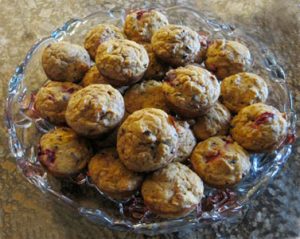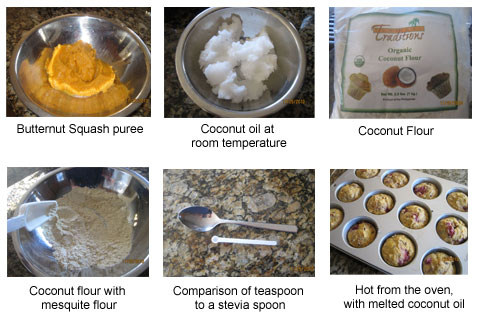There’s been a lot of press lately on the deleterious effects of excess carbohydrates in our diets—our obsession with convenience foods, sweet treats and sugary drinks has been implicated in the explosion of diseases such a diabetes and cancer, as well as cardiovascular diseases and obesity.
Every time I talk with someone about this issue, either in my practice or in casual conversation, inevitably there is mention of either missing starchy comfort foods, or of the difficulty in eating ‘that way’—meaning, food that isn’t grabbed from a plastic wrapper or paper bag, or frozen and re-heated in the microwave. And, to add insult to this injury, I’ve found many of the ‘natural’ convenience foods to not be much better, in terms of their sugar and carbohydrate load—oftentimes they’re every bit as sugary as their conventional ‘twins.’
So, in an effort to make convenience work in the realm of truly eating healthy, one really does have to plan ahead. That is why I like this muffin recipe (and some variations I make on its basic premise.) I make enough to last a number of days in the refrigerator for our family of four, as a between-meal snack with some yogurt or a piece of raw cheese, or in my kids’ lunches with sliced apples, carrots and some raw nuts. I see us reaching for one of these muffins, as well, when we want a bit of that comfy, sweet feeling which comes from goodies from the oven—these re-heat wonderfully in the toaster oven. This recipe is a very nutritious and tasty treat—it’s full of protein, healthy fats, antioxidants and fiber, while being much lower in sugar than the usual muffin. Top these with a dollop of organic butter just as you take them from the oven for a warm, satisfying indulgence.
Raspberry-Cacao-Butternut Squash Gluten-Free Muffins
Makes 24 Muffins

3/4 c. Coconut Flour
1/4 c. Mesquite Flour*
1 c. unrefined Coconut Oil, melted
1 dozen Eggs
1 c. mashed Butternut Squash
3 T. Xylitol or an unrefined Sugar, such as Rapadura
7 spoons’ concentrated Stevia powder**
1/3 t. Sea Salt
1 1/2 t. Vanilla extract
3/4 t. ground Nutmeg
1 t. ground Cinnamon
1 c. chopped organic Walnuts
1/4 c. Cacao Nibs
3/4 c. frozen organic Raspberries
Preheat oven to 400 degrees. Coat the inside of 24 muffin tins with coconut oil or butter, or line with cupcake liners. Bake for 15 minutes, or until a toothpick comes clean when poked in the middle of a muffin.
*If opting to not use mesquite flour, simply add back in and additional _ c. of coconut flour in its place.
*If opting to not use stevia, simply add in an additional 2-3 t. xylitol or sugar.

I’ve waxed on about the virtues of coconut flour in prior articles—it has the highest content of dietary fiber of any flours, which is so important for the digestive tract and the cardiovascular system—I especially like coconut flour from Tropical Traditions, http://www.tropicaltraditions.com/organic_coconut_flour.htm. In Chinese medicine, this flour is recognized as being warming and sweet, and strengthening to the body. Nutritionists recommend a fiber intake of 20-35 grams a day, while most people average about 10-14 grams a day; including coconut flour in your cooking will greatly increase your consumption of fiber.
Mesquite flour is derived from the pods of the mesquite trees of the American desert southwest. Native Americans have used this flour for centuries, and like coconut flour, it is also very rich in protein, is gluten-free, high fiber and is a low-glycemic flour. It has a nutty taste and is slightly sweet. I am fortunate enough to live in the region where these trees are plentiful, and have sourced my mesquite flour from a local vendor. However, The Raw Food World, http://www.therawfoodworld.com/, has a wonderful organic mesquite flour as well. In Chinese medicine it would be classified as tonifying and benefiting the Earth element, encompassing the Spleen and Stomach meridians.
Coconut oil is another incredible food—its high concentration of lauric acid (which is also found in mother’s milk) has been shown in many studies to enhance immunity by disrupting the fatty, outer membranes of pathogenic organisms. In addition, it is an oil that has a high-smoke point, meaning it can be heated to higher temperatures in cooking and baking, without being damaged by the intense heat.
You may notice the great number of eggs in this recipe—this is in large part because we are working with gluten-free flours. In wheat-based recipes, it is the gluten that works as a ‘glue’ to bind the ingredients together; in gluten-free cooking and baking, using eggs can work as a substitute for this missing ‘glue.’ An added bonus to using eggs in this manner and in this quantity means that a given recipe will be much higher in protein and the various other nutrients that are found in eggs. Chinese medicine recognizes eggs for their sweet flavor, neutral temperature, and for being nourishing to the blood and fluids of the body.
Butternut squash helps to naturally increase the sweetness of the muffins, as well as boosting the Vitamin A and fiber content. It is also a benefit to the Earth element in Chinese Medicine, with a warming nature.
I’ve become quite enamored with the use of stevia in my cooking—to have an ingredient that offers such an intensely sweet flavor with no increase in one’s glycemic index is a terrific find. It does require some getting used to, as well as discerning exactly what is the correct amount to use. However, I’ve found that using stevia for the greater portion of the sweet flavor, and then using either an unrefined sugar or xylitol as the lesser sweetener allows for a very sweet flavor that tastes balanced on the palate. I encourage you to begin using it—my rule of thumb in transitioning to using it regularly is to begin increasing the amount you use in something you sweeten, while simultaneously reducing the amount of your regular sweetener. So, if you use a teaspoon of sugar or honey in your tea, use _ teaspoon instead, and add a little stevia to bring it to the desired sweetness. Keep doing this over a few days, each day using slightly less of your usual sweetener, and a little more of the stevia. You may find that soon you can switch to using only stevia, or that you’re most comfortable with some kind of a mix of the two.
The other sweetener listed, xylitol, is a sugar alcohol, derived from the fibers of many fruits and vegetables. Unlike the very-sweet stevia, it is about as sweet as sugar, and looks and tastes just like sugar. However, unlike sugar, it has been shown to have good effect on dental health. It is unsafe for dogs, though, leading to hypoglycemia–keep it, and any foods in which it’s used, away from your pets.
The spices used in these muffins are warming in nature, lending to the tonifying, nutritive quality of this recipe—they are the quintessential winter spices, benefiting the digestion and the immune system.
Walnuts are an excellent tonic for brain and cardiovascular function, being full of omega-3 fatty acids and vitamin E. In Chinese medicine, they are recognized for their ability to tonify the energy of the kidney adrenal system, and may be used in scenarios of chronic cough and wheeze, where the body’s energies are being depleted by the long-standing cough.
Raspberries offer a good source of Vitamin C in this recipe, and they add a nice tartness to the sweet flavor of the muffins. They are a rich source of antioxidants, being a boon to the immune system, and to eye health. Their sweet and sour flavor is recognized as benefiting the blood in Chinese medicine, where they help to build and cleanse the blood.
Cacao nibs are another great source of antioxidants, as well as magnesium and Vitamin C. Certainly, they offer a wonderful chocolate crunch to the recipe, but they also help to benefit blood sugar function, as they are a rich source of chromium, which is woefully missing in most diets, and yet is key to stabilizing blood sugar. Cacao is the source of cocoa and chocolate, but it is in its raw form here, and isn’t sugary at all—in fact, it is a little bitter (which one can taste in darker varieties of chocolate.) Balanced by the sweetness of the muffin, their flavor is a good counterpart to the rest of the recipe.
Sarica Cernohous, L.Ac., MSTOM, is a licensed practitioner of Traditional Chinese Medicine, living and practicing Japanese Acupuncture, Herbal Medicine and Nutritional Counseling in Peoria, AZ.
The information listed above is not intended to treat, cure or prevent illness or disease.









